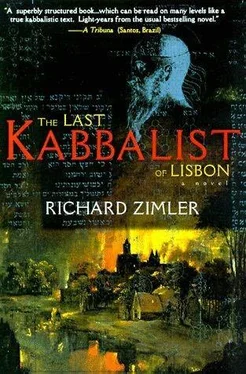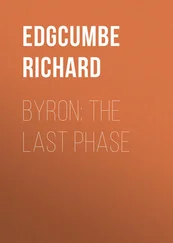Richard Zimler - The Last Kabbalist of Lisbon
Здесь есть возможность читать онлайн «Richard Zimler - The Last Kabbalist of Lisbon» весь текст электронной книги совершенно бесплатно (целиком полную версию без сокращений). В некоторых случаях можно слушать аудио, скачать через торрент в формате fb2 и присутствует краткое содержание. Год выпуска: 1998, Издательство: Arcadia Books, Жанр: roman, Исторический детектив, Философия, на английском языке. Описание произведения, (предисловие) а так же отзывы посетителей доступны на портале библиотеки ЛибКат.
- Название:The Last Kabbalist of Lisbon
- Автор:
- Издательство:Arcadia Books
- Жанр:
- Год:1998
- ISBN:нет данных
- Рейтинг книги:5 / 5. Голосов: 1
-
Избранное:Добавить в избранное
- Отзывы:
-
Ваша оценка:
- 100
- 1
- 2
- 3
- 4
- 5
The Last Kabbalist of Lisbon: краткое содержание, описание и аннотация
Предлагаем к чтению аннотацию, описание, краткое содержание или предисловие (зависит от того, что написал сам автор книги «The Last Kabbalist of Lisbon»). Если вы не нашли необходимую информацию о книге — напишите в комментариях, мы постараемся отыскать её.
The Last Kabbalist of Lisbon — читать онлайн бесплатно полную книгу (весь текст) целиком
Ниже представлен текст книги, разбитый по страницам. Система сохранения места последней прочитанной страницы, позволяет с удобством читать онлайн бесплатно книгу «The Last Kabbalist of Lisbon», без необходимости каждый раз заново искать на чём Вы остановились. Поставьте закладку, и сможете в любой момент перейти на страницу, на которой закончили чтение.
Интервал:
Закладка:
As Carlos and I stepped inside, he grimaced at the sour scent of fresh whitewash on the walls. While he and my little brother checked the cellar for Uncle, I went to my room to peer through its inner window into our store. Down the center aisle, beyond baskets of figs and dates, raisins and sultanas, bitter oranges, filberts and walnuts, all manner of fruit and nut then to be found in Portugal, were Cinfa and my mother, Mira, spooning olives from wooden barrels into ceramic bowls for display. I leaned in and called out, “Blessed be He who has illuminated our Lisbon morning!”
Cinfa showed me a quick smile. A gangly, wild sort of girl, with a voice forever seemingly squeaked between knuckles jammed into her mouth, she’d been gifted with grace of late. Almost twelve she was, and an adult beauty was awakening in the secretive fullness of her lips, her high cheekbones and postures of reserve. The girl who had spent hours chasing hares and capturing tadpoles was giving way to one more interested in puzzling over the modest, hazel-eyed twin in the looking glass.
As Cinfa and I kissed, my mother offered me a dull, antagonistic look. A small, puffy woman of lowered eye and bent shoulder, her contours were concealed as always inside a loose-fitting olive tunic and black apron. Her deep-brown hair, streaked a brittle gray at the front, was crowned by a toque of gray lace and clasped into a bun at the back of her head. The bun was tied with a black velveteen ribbon from Jerusalem given her years ago by her elder brother, my uncle Abraham. Its stringent hold seemed to draw the color from her face, which, over the last few years, had swollen into an expression of wan defiance against any possibility of happiness; she would forever be grieving her long-buried husband and first-born son, my elder brother Mordecai. To all who knew the playful young mother she’d been, her wasted state was a reminder that life saved its sharpest arrows for women, the bearers—and mourners—of departed children.
“Either of you seen Uncle?” I asked.
Cinfa shrugged. Mother licked her cracked lips as if displeased by my interruption, shook her head.
Father Carlos and Judah met me in the kitchen. “No sign of him,” the priest said.
We sat together at the table to wait. Aunt Esther appeared suddenly at the courtyard door, dressed in a high-collared black jupe which seemed to light her tawny face. Her dramatic, darkly outlined almond eyes opened in horror. “What are those stains?!” she demanded, pointing to my pants. “Has Judah been crying?!” She clamped her jaw into an expression of judgment, glared at me while tucking wisps of henna-tinted hair under her crimson headscarf. Slender and tall, possessed of a deeply lined and shadowed beauty, she could dominate a room with a single glance down the length of her elegant nose.
“Just a little blood,” I began to explain to her. “The flagellants were…”
She thrust out her hand and sucked in on her cheeks so that she looked like a Moorish dancer. “Don’t tell me! I don’t want to hear it! Dear God, can’t you even clean yourselves? And whatever you do, don’t let your mother see Judah like that. We’ll never hear the end of it!”
“Yes, go wash,” Father Carlos agreed with a dismissing twist to his hand. He turned to Aunt Esther and added, “I told him it’s the first thing he should do when we got back.”
I shot the priest a dirty look. He curled his lips into a wry smile and lifted his eyebrows as if we were rivals for my aunt’s affection. To her, he said, “Now, about my little problem…”
I took Judah with me to our bedroom and slipped off his clothes, then my own. As I cleaned him with the vinegar and water solution which my mother always insisted upon, his body went limp in my hands. A compact five-year-old, already muscular and possessed of seductive gray-blue eyes, he seemed destined to grow into a milk-skinned Samson.
Never one for bathing, he dashed back to the kitchen the moment I’d finished dressing him. When I entered the room, he was clinging to the fringe of Aunt Esther’s jupe while fingering his wooden top. She was preparing her beloved coffee with almond milk and honey the way she’d learned in her native Persia.
From outside, the sour rumbling and creaking of refuse carts was suddenly drowned out by a woman’s shrieks. Opening the shutters to listen, I spotted a familiar vermilion carriage careening down the street. As always, the horses were caparisoned in blue-fringed silver cloth. The usual driver, an Old Christian with pockmarks cratering his cheeks, had been replaced, however, by a fair-haired Goliath in a wide-brimmed, amethyst-colored hat. “Guess who’s coming,” I said.
Aunt Esther nudged me partially aside and peered out. “Oh dear, Dona Meneses. More work for Mira,” she grumbled. She squeezed my hand. “You shouldn’t stand here staring out at her.”
I rolled my eyes, turned away. The carriage pounded to a stop and the door squealed open. Dona Meneses’ pattering footsteps trailed toward the Temple Street entrance to my mother’s room. As she entered the house, she began to describe the qualities of the fabric she’d brought in false, lyric tones. Her voice trailed away to a soft murmur as my mother’s door was closed.
Aunt Esther leaned toward us as if to disclose a secret and said, “It’ll be a miracle if Mira can turn that hideous puce velvet she brought with her into anything presentable!” Marching to the hearth, she carried our matzah to the table with a linen mitten.
“It pays our debts,” I said.
“True. And with the drought…”
“It’s the Devil!” Father Carlos exclaimed suddenly in a voice of warning.
“I grant you that Dona Meneses isn’t lovely, but she’s hardly from the Other Side,” I replied.
The priest squinted his eyes and glared at me. His tongue darted between his thick, soft lips. “Not her, you fool! It’s the Devil who’s behind the plague and drought!”
“You’re an absolute lunatic,” Aunt Esther told him in Hebrew with that frown of hers that could freeze bathwater. “And keep your voice down—we don’t want to scare her away!”
The bells of St. Peter’s began tolling tierce. Father Carlos mumbled to himself as if succumbing to the religious call, said a quick grace and picked on a piece of warm matzah with his chubby fingers. In a tone of disgust, he continued in the Holy language, so that Judah wouldn’t understand, “You mean to say, Esther dear, that the Devil doesn’t exist?”
“I mean to say that if you scare my little nephew one more time with your nonsense…” And here, Aunt Esther lifted her iron poker from the fire and aimed its red-glowing tip toward the priest’s bulbous nose, “…I’ll see to it that you meet your Christian savior sooner than you intended! Find someone else to scare!”
“Your aunt has always had a way with threats,” Carlos whispered to me with a lecherous smile. “Remember her the day they dragged you out to be baptized in the cathedral? She cursed them in seven different languages…Hebrew, Persian, Arabic, Portuguese…”
“We remember,” I interrupted, holding up my hand in a gesture of disapproval so that we could all avoid the memory. Too late; Esther’s eyes, dimmed by isolation, were focused on an inner landscape. She had slipped her hand below her crimson scarf, was tracing the outline of the cruciform scar given her on the accursed morning of our forced baptism. Then, she had fought hardest of all against the bailiffs sent by the King to drag the Jews to the cathedral. As an example, a guard had thrown her to the ground, pinned her legs and arms to the cobbles on the Rua de São Pedro. A Dominican friar had pressed a red-glowing iron cross vertically to her forehead. He’d shouted, so all could hear: “I hereby gift you with the sign of our Lord!”
Читать дальшеИнтервал:
Закладка:
Похожие книги на «The Last Kabbalist of Lisbon»
Представляем Вашему вниманию похожие книги на «The Last Kabbalist of Lisbon» списком для выбора. Мы отобрали схожую по названию и смыслу литературу в надежде предоставить читателям больше вариантов отыскать новые, интересные, ещё непрочитанные произведения.
Обсуждение, отзывы о книге «The Last Kabbalist of Lisbon» и просто собственные мнения читателей. Оставьте ваши комментарии, напишите, что Вы думаете о произведении, его смысле или главных героях. Укажите что конкретно понравилось, а что нет, и почему Вы так считаете.












